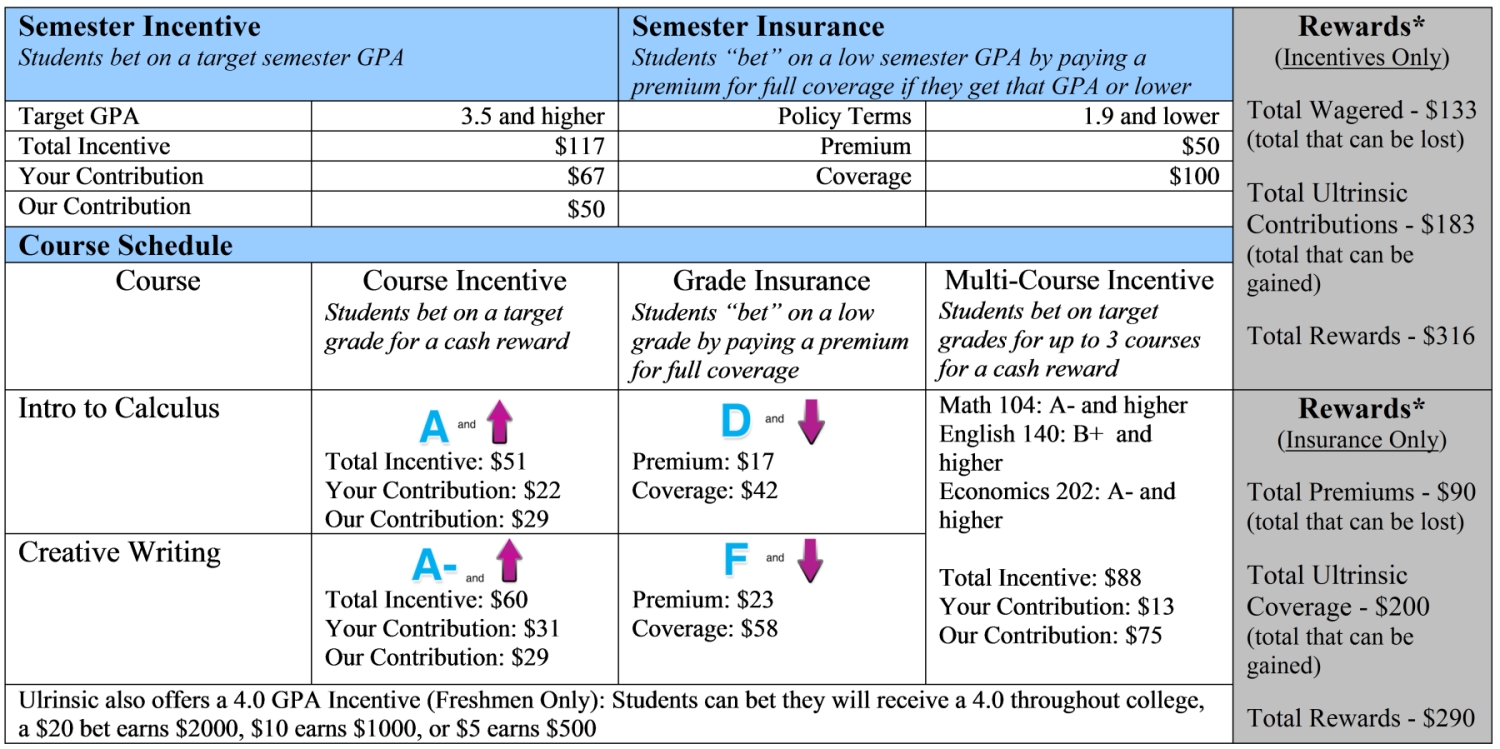Addiction & the Humanities, Vol. 6(8): Cash for Good Grades…or Bad Grades – Motivation to Succeed?
Ultrinsic, “ULTerior motivation that produces intRINSIC love of knowledge” ("Ultrinsic," 2010), is a company that allows college students to bet on the grades they will receive during the semester. Students who get their predicted grade, or better, win back their wager, plus a reward from the company. Those who do not get the grade lose their wager. Ultrinsic claims that their monetary incentives motivate students to improve their grades and succeed academically. However, motivation research (Ryan & Deci, 2000) suggests that Ultrinsic’s monetary awards could backfire in the end (see http://www.psych.rochester.edu/SDT/theory.php for a summary of Ryan & Deci’s self-determination theory).
Currently, Ultrinsic is available to students at, but not affiliated with, 36 US colleges and universities (e.g., Harvard University). Undergraduate students who do not already have a 4.0 grade point average (GPA) can open an account by providing to Ultrinsic the school they are attending, their course schedule, and academic history. Ultrinsic verifies grades through official transcripts or online school accounts before depositing cash rewards into accounts. Students can use the rewards to place future bets or request a check.
Ultrinsic determines students’ rewards (see Figure 1) using an algorithm based on the amount wagered, the student’s GPA or academic history and the difficulty of the class. Although Ultrinsic allows users to see how much money they can win before they place a bet, students who typically get A’s and bet the same amount for the same grade as students who typically get C’s will win less money.
Figure 1: Ultrinsic’s Betting Activity Types & Hypothetical Contributions (adapted from Ultrinsic.com’s online demo)
*Incentives and Insurance are shown separately since most students would not bet on good and bad grades for the same course.
Although Ultrinsic claims its service promotes good scholarship, research suggests that this might not be the case over time. Studies show, for example, that individuals who receive financial external rewards for tasks experience less intrinsic motivation (i.e., motivation that is generated internally, such as interest or curiosity) to complete those tasks (Deci, 1971). Similarly, compared to extrinsic goals (i.e., goals that focus on external consequences outside of the task alone), intrinsic goals (i.e., goals that are self-satisfying independent of external factors) are more likely to lead to short and long-term persistence and a more comprehensive understanding of academic material (Vansteenkiste, Lens, & Deci, 2006). Furthermore, extrinsic goals can also predict several negative outcomes, including cheating (Anderman, Griesinger, & Westerfield, 1998). It is important to note that extrinsic motivation might enhance intrinsic motivation if individuals identify with and internalize extrinsic motivators (e.g., striving to receive a good grade [the extrinsic motivator] because one understands and values the importance of doing well in school for future quality of life). However, reward, punishment or deadline-driven extrinsic motivators are less likely to be internalized (Ryan & Deci, 2000).
Ultrinsic’s stated goal is to motivate students to achieve by giving them an opportunity to bet on their grades and receive a cash reward if they succeed. Motivation research suggests that Ultrinsic might compromise this goal. The company is providing an external reward that is not closely tied to intrinsic motivation. Also recall that Ultrinsic offers rewards for bad grades. If students do not possess intrinsic motivation to succeed academically, they could potentially use the site only for its pay-offs – slacking one semester and then doing really well the next to obtain the most money possible. Future empirical research is needed to determine how this company’s goal affects today’s students.
-Tasha Chandler
What do you think? Please use the comment link below to provide feedback on this article.
References
Anderman, E. M., Griesinger, T., & Westerfield, G. (1998). Motivation and cheating during early adolescence. Journal of Educational Psychology, 90, 84-93.
Deci, E. L. (1971). Effects of externally mediated rewards on intrinsic motivation. Journal of Personality and Social Psychology, 18(1), 105-115.
Ryan, R. M., & Deci, E. L. (2000). Self-determination theory and the facilitation of intrinsic motivation, social development and well-being. American Psychologist, 55(1), 68-78.
Ultrinsic. (2010). Retrieved September 2, 2010, from http://www.ultrinsic.com/
University of Rochester. Self-Determination Theory: An Approach to Human Motivation & Personality. Retrieved September 2, 2010, from http://www.psych.rochester.edu/SDT/theory.php
Vansteenkiste, M., Lens, W., & Deci, E. L. (2006). Intrinsic versus extrinsic goal contents in Self-Determination Theory: Another look at the quality of academic motivation. Educational Psychologist, 41(1), 19-31.